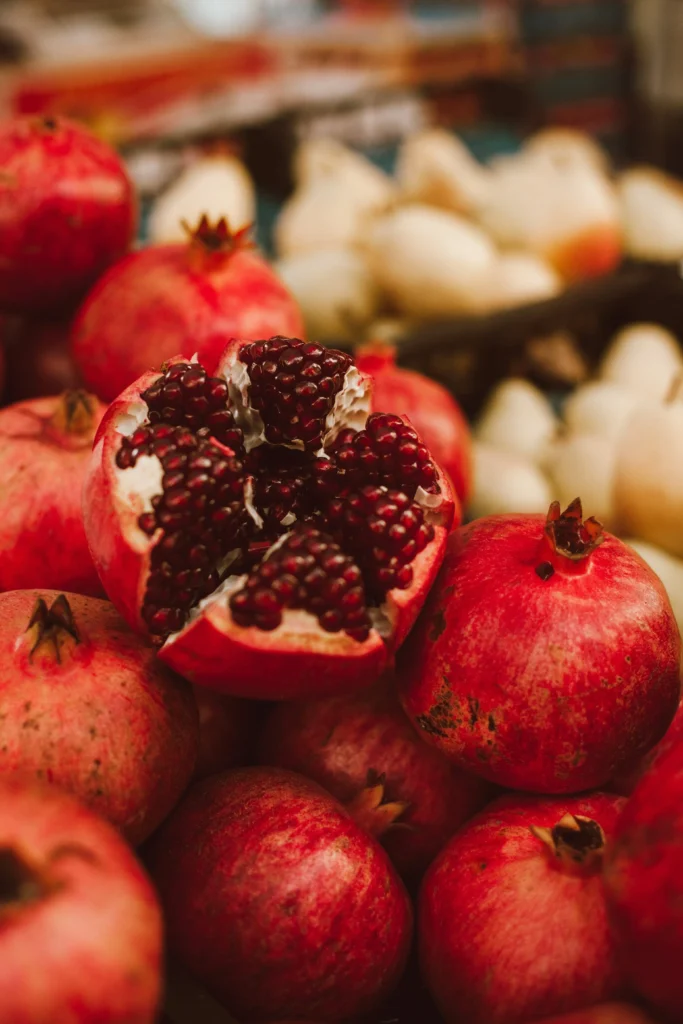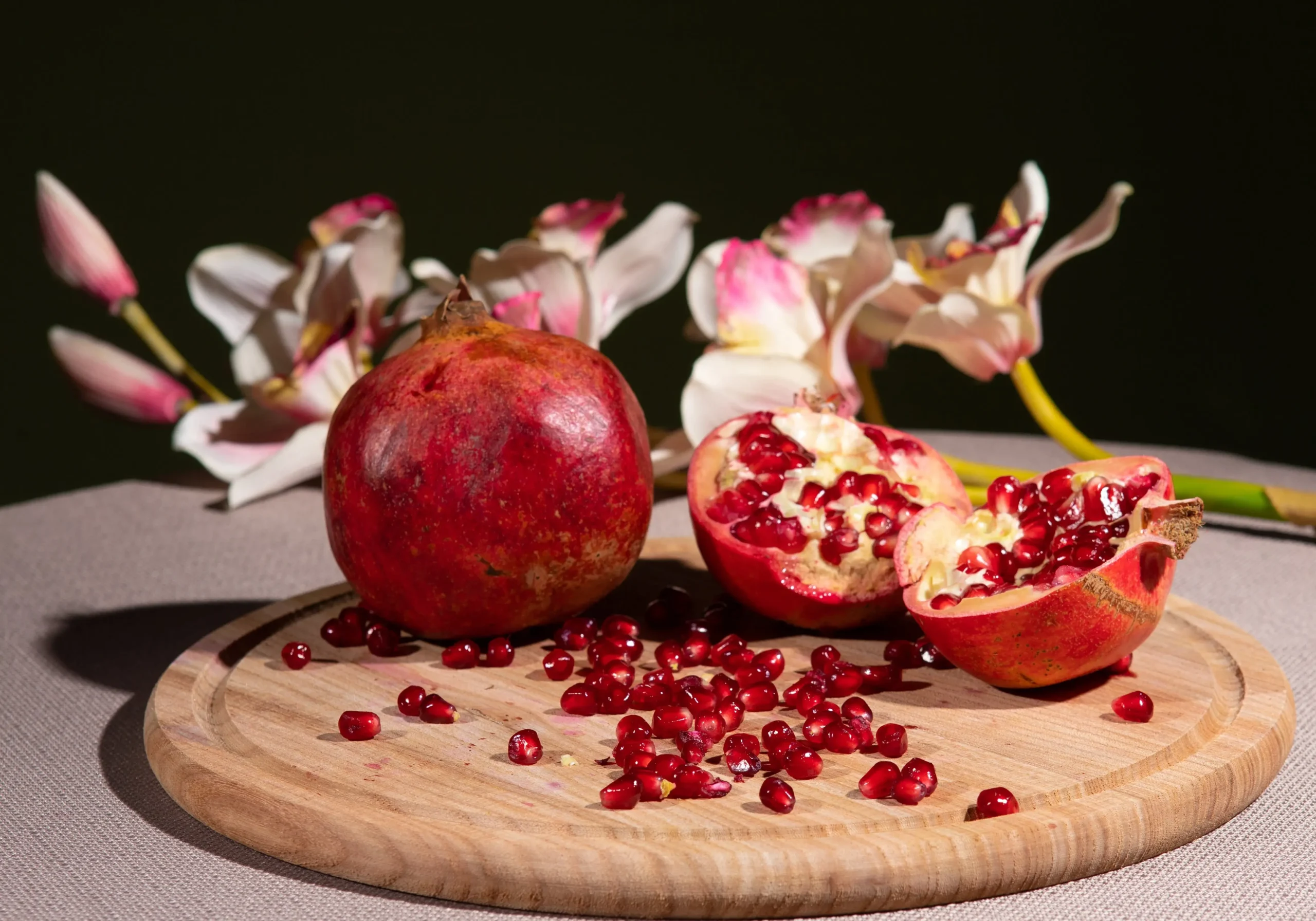Revealing the Intense Harmony of Tastes: What Do Pomegranates Taste Like?
There aren’t many fruits that can captivate the senses like pomegranates. Pomegranates, with their vivid colours and juicy seeds protected by a hard shell, are prized for their distinct flavor and several health advantages. We will explore what do Pomegranates taste like as well as its nutritional value, culinary uses, cultural significance, and intriguing worldwide cultivation, which makes pomegranates a real gem of the natural world.
What Do Pomegranates Taste Like:The Delectable Flavor of Pomegranates:
Often referred to as “nature’s jewels,” pomegranates provide a taste that is tart and sweet with a hint of bitterness in the aftertaste. Imagine the wonderful harmony of acidity that reminds you of cranberries and sweetness that tastes like cherries. It’s a palate-pleasing symphony. Like any fruit, everyone has different tastes; some people may find the flavor excessively astringent or sour, while others may enjoy its complexity.
The secret to choosing the ideal pomegranate is to look for firmness and ripeness. A mature example will have a rich crimson hue and a substantial feel relative to its size. It’s easy to remove the tasty seeds from the luscious, meaty pulp that surrounds them, and they make a delightful treat. Just split this delicious fruit in half, then use your fingers to gently pry out the seeds, or use a spoon to scoop them out.
Value for Nutrition and Health Benefits:
| Nutrient | Amount per Cup (Approximate) |
| Calories | 83 |
| Total Fat | 1.17 gram |
| Sodium | 3 milligrams |
| Total Carbohydrates | 18.7 grams |
| Dietary Fiber | 4 grams |
| Sugars | 13.67 grams |
| Protein | 1.67 grams |
| Vitamin C | 10.2 milligrams (17% DV) |
| Vitamin K | 16.4 micrograms (21% DV) |
| Folate | 38 micrograms (10% DV) |
| Potassium | 236 milligrams (7% DV) |

In addition to being low in calories, pomegranates are a wonderful source of potassium, vitamin C, and dietary fiber. They also contain a lot of antioxidants, which may add to their possible health advantages. Remember that the exact variety and size of the pomegranate might have a modest impact on the nutritional value.
Pomegranates have several health advantages because of their high antioxidant content. Punicalagins and anthocyanins are examples of antioxidants that fight oxidative stress, lowering the risk of chronic illnesses and boosting immunity. Studies have connected pomegranates to heart health, indicating that they can lower blood pressure, cholesterol, and have anti-inflammatory qualities that are good for the cardiovascular system.
Beyond just the heart, the anti-inflammatory properties also help those with arthritis and other ailments. Pomegranates have the potential to be an ally in maintaining joint health because of their capacity to inhibit inflammatory pathways and diminish the production of inflammatory markers.
Furthermore, research suggests that pomegranates may help prevent cancer because of their antioxidants, which may slow the formation of some types of the disease. Pomegranate polyphenols have shown promise in inhibiting the growth of cancer cells and triggering programmed cell death.
Gourmet Treasures Found in Pomegranates:
Not only are pomegranates delicious, but they are also a very adaptable element in cooking. Pomegranates have several uses in cooking, from juices to salads, sweets, and more:
Juice: Pomegranate juice is a well-liked and cooling beverage due to its high antioxidant content. It tastes well either by itself or combined with other juices to produce a different kind of flavor.
Seeds: Arils, or pomegranate seeds, are a delicious garnish for salads, yogurt, and sweets. Their crisp and sweet texture adds flavor to a range of meals.
Salads: Pomegranate seeds give salads an unmatched pop of taste and brilliant colour. They provide a symphony of flavors when combined with other fruits like apples, grapes, and cherries.
Recipes: Pomegranates can be added to a wide variety of dishes, such as smoothies, desserts, marinades, and sauces. They go well with both Savory and sweet recipes because of their adaptability.
Desserts: Pomegranates give cakes, pies, and other sweet delicacies a sweet, tart flavor that enhances their flavor. They go very well with other fruits and nuts, whether they are dry or fresh.
Pomegranates in Various Cultural Contexts:
Pomegranates have been included into the culinary, medical, and religious traditions of many cultures all over the world.
India: Pomegranates, referred to as “anar” in Indian cuisine, are an essential ingredient. They are a main ingredient in curries, raitas, and chutneys. Furthermore, pomegranates are culturally significant in Hindu mythology, where they are linked to prosperity and fertility.
USA: Pomegranates are mostly consumed in the US as juice, which is often added to salads and sweets. The fruit’s strong antioxidant content and its health advantages have caused its popularity to surge in recent years.
Mediterranean: Pomegranates have been a mainstay in Middle Eastern, Greek, and Turkish cuisines for ages. They appear in salad dressings, dips, stews, and desserts; in certain cultures, they are considered lucky charms.

Impact of Global Cultivation on the Economy:
Pomegranates are grown all throughout the world and do best in warm settings. Turkey, Iran, and the United States are among the major producers. Pomegranate agriculture thrives in parts of India like Maharashtra, Karnataka, and Andhra Pradesh, which makes a substantial contribution to the nation’s agricultural production.
There are several careful processes in the growing process, from choosing the best type to making sure the soil and climate are perfect. Pomegranate trees prefer soil that is well-drained and has a pH of 5.5 to 7.0. India’s varied agroclimatic zones make it a perfect place to cultivate several kinds of pomegranates.
India’s agricultural output has increased due to pomegranate planting, which has also given many farmers a means of subsistence. Pomegranates have a major economic influence on the regions where they are grown. Due to the fruit’s popularity in both local and foreign markets, farmers now have more opportunity to grow their orchards, which boosts their revenue and promotes economic stability.
How to Purchase and Store Pomegranates:
The key to buying pomegranates is to select mature, hefty fruits with flawless skin. These fruits, which are in season from October to January, can be kept for up to a week at room temperature or longer if they are refrigerated. Pomegranate seeds should not be frozen, although they can be frozen for up to six months after being removed, keeping their flavor and freshness.
As we come to the end of our investigation into the world of pomegranates, it is clear that this jewel-like fruit has many culinary applications in addition to its distinct and wonderful flavor. Pomegranates bear witness to the diversity and richness inherent in the abundance of nature, whether they are consumed raw, in juices, or combined with other ingredients in a variety of recipes.
Accept the bright flavor of pomegranates and let your senses be captivated by their harmonious blend of sour and sweet notes. Pomegranates continue to have a special position in history and on tables today all around the world, calling us to enjoy the benefits they offer to our health and taste sensibilities.
-
Some Important Frequently Asked Question
- Are pomegranates worth eating?
Pomegranate consumption may strengthen heart health, assist with exercise capacity and recuperation, and enhance cognitive function. Pomegranates are also a good source of several antioxidant and anti-inflammatory plant components, as well as important nutrients including vitamin C and folate.
- Are pomegranate seeds sweet or sour?
When pomegranate seeds are ripe, they have a sweet, tart, and refreshing taste. You might discover that the easiest way to get to the seeds is using a wooden spoon or knife. The plant known as pomegranate (Punica granatum) bears fruit.
- Can you eat pomegranate raw?
Pomegranate seeds are best eaten fresh and uncooked or as a garnish because heating them will lose some of their flavor.
- Is it OK to swallow the pomegranate seeds?
They provide vital nutrients and antioxidants for a host of health advantages. Is It Okay for You to Eat Pomegranate Seeds? It is indeed completely safe! After correctly chewing them, you can fully benefit from their health benefits by swallowing them.
- Who should not eat pomegranate?
Consult your doctor before consuming any fruit juice, including pomegranate juice, if you have diabetes. Avoid taking pomegranate extract or drinking pomegranate juice if you have diarrhea. Pomegranate extract may contain fruit rind, which is why pregnant women should avoid using it.
- Pomegranate benefits for female?
The following are a few advantages of pomegranates for women:
- Rich in nutrients: One of the healthiest foods is pomegranates.
- Encourages good skin
- Aids in the fight against breast cancer:
- Encourages hair growth:
- Boosts fertility:
- What do pomegranates taste like to eat?
Pomegranates are a special kind of fruit distinguished by their vivid crimson hue and succulent, edible seeds. Their peculiar flavor is sweet and tangy, with a hint of bitterness in the aftertaste. Some claim that the flavor tastes like cherries or cranberries.
You may also Read our Finance, World News, Local News, Health, Food, and Education articles.
খাসটাইমস বাংলা সম্পর্কে আরও বিস্তারিত ও নতুন খবর জানতে ক্লিক করুন। সব ধরনের ব্রেকিং, আপডেট এবং বিশ্লেষণ সবার প্রথম বাংলায় পড়তে ক্লিক করুন।

